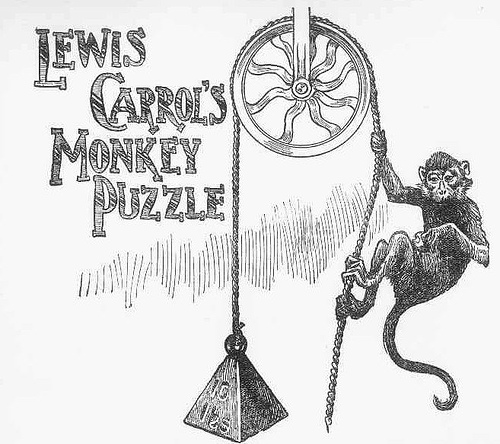
“Here is a quaintly told problem in mechanics, which, despite its apparent simplicity, is said to have caused Lewis Carroll considerable disquietude,” writes Sam Loyd in his Cyclopedia of 5000 Puzzles, Tricks, and Conundrums (1914). He quotes Carroll:
If, to a rope, passed over a loose pulley, is suspended a ten-pound counter weight, which balances exactly with a monkey eating an apple, swinging at the other end, what would be the result if the monkey attempts to climb the rope?
“It is very curious to note the different views taken by good mathematicians,” Carroll noted. “Price says the weight goes up with increasing velocity. Both Clifton and Harcourt maintain that the weight goes up at the same rate of speed as the monkey; while Sampson says that it goes down.”
So which is it? Be warned, Loyd’s thinking is inconclusive.
|
SelectClick for Answer |
Lewis Carroll’s monkey puzzle is about as paradoxical as a recent conundrum which is going the rounds, as to what is it that will go down a chimney down, but will not go up a chimney up? (Umbrella.) There are three possible consequences to select from in the monkey problem: The progress of climbing might have no effect whatever upon the equilibruim; it might cause the weight to fall, which would raise the monkey quicker than he wished, or it might raise the weight, which would be apt to give the monkey a tumble. From the standpoint of a guess, pure and simple, opinions were about evenly divided, so two out of three were wrong in their conclusions.
From a theoretical and scientific point of view it is just as paradoxical as the umbrella conundrum, for if the monkey goes up he will go down, whereas if he goes down he will go up. The argument is based on Newton’s law that “action is equal to reaction.” The engine which moves a train is pulling itself along by the rails. Theoretically speaking, if there was no friction, a fly could not crawl up that rope without destroying the equilibrium, so that the rope would be drawn over the pully and the monkey end fall by a rapidly increasing momentum.
And there he leaves it.
|

